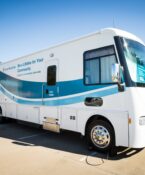HSC announces $7 million research investment to determine why African Americans have highest prevalence of Alzheimer’s
By Alex Branch
The University of North Texas Health Science Center at Fort Worth (HSC) announced a $7 million investment to research the biological differences that put African Americans at greater risk of Alzheimer’s disease and to develop new treatments that prevent the deadly disease.
Among people 65 and older, African Americans have the highest prevalence of Alzheimer’s disease, followed by Hispanics and non-Latino whites, according to the U.S. Center for Disease Control and Prevention. But most Alzheimer’s research focuses on non-Latino whites.
African Americans will now join Mexican Americans and non-Latino Whites in HSC’s historic HABLE study, which recently received an additional $45 million from the National Institute on Aging, part of the National Institutes of Health, to explore the biological differences that cause Alzheimer’s to disproportionately afflict Mexican Americans.
HABLE Study
For information about participation in the HABLE study, contact the Institute for Translational Research at 817-735-2963.
“This significant investment allows us to incorporate African Americans into HSC’s ground-breaking research into Alzheimer’s, a disease that has long disproportionally impacted the African American community,” HSC President Dr. Michael Williams said. “HSC is proud to lead the way in discovering new interventions that could transform how we prevent and treat Alzheimer’s disease in the future.”
The investment aligns with HSC’s commitment to confront racism as a public health emergency and to reduce racial health disparities. By 2020, there will be an estimated 3.2 million Hispanics and 2.2 million African Americans with Alzheimer’s disease and related dementias.
“Improving the health and well-being of people living in Fort Worth’s most vulnerable communities is a mission that I am proud to share with the Health Science Center,” said Tarrant County Commissioner Roy C. Brooks. “Alzheimer’s disease is just one of many health disparities that disproportionally impacts African Americans, and I encourage those who qualify to take advantage of this tremendous opportunity.”
A lack of participation by minorities in medical research has long been a significant challenge when it comes to creating solutions to reduce health disparities, said Rear Admiral (ret) Dr. Sylvia Trent-Adams, HSC Chief Strategy Officer and former Acting U.S. Surgeon General.
“African Americans, for example, have historically held a deep mistrust of medical institutions and the health care system,” Dr. Trent-Adams said. “HSC is proud to lead the way in breaking down these barriers and building a relationship of trust.”
Alzheimer’s Research
First-of-its-kind research is underway at HSC to detect Alzheimer’s disease earlier and develop new treatments. We need your support to make it happen.
Sid O’Bryant, PhD, Professor and Executive Director of the Institute for Translational Research, and Leigh Johnson, PhD, Associate Professor and Associate Director, lead the HABLE study. The $45 award from NIH was the largest research award ever received by The University of North Texas Health Science Center at Fort Worth.
The study started in 2017 with a $12 million National Institutes of Health grant. Almost 1,000 Mexican Americans and 1,000 non-Latino whites over 50 from North Texas have enrolled in the study into how different biological causes relate to Alzheimer’s disease across ethnicities.
Each participant undergoes free comprehensive interviews, functional exams, clinical laboratory tests, a brain MRI and more.
HSC has created a state-of-the-art imaging center in the Institute for Translational Research where the research team will perform two PET Scans on every HABLE participant to look for beta amyloid or tau proteins, which are biomarkers for Alzheimer’s. Two years later, each participant will undergo two more PET Scans for comparison of how the proteins have progressed.
The scans allow researchers to observe the differences in Mexican Americans and non-Latino whites. Preliminary data suggests that beta amyloid protein differs significantly in prevalence between the two ethnicities, Dr. O’Bryant said.
With the addition of African Americans, the cohort of participants will grow to 3,000. The research team expects to begin recruiting African Americans into the study in January, Dr. O’Bryant said.
“The significant expansion will allow us to understand how medical conditions like diabetes and hypertension, which are both more prevalent in African Americans and Mexican Americans communities, are associated with Alzheimer’s disease,” Dr. O’Bryant said. “In addition to medical risk factors, we can look at how socioeconomic status and sociocultural and environmental factors also impact this disease.”
Because the new imaging center where participants undergo PET scans is on the HSC campus, study participants won’t have to be referred to private imaging centers for the valuable but costly scans. Very few research laboratories in the country will have imaging capabilities of the caliber at the Institute for Translational Research at HSC, Dr. O’Bryant said.
In addition to contributing to the discovery of potential future therapeutics, study participants can benefit immediately from medical information gathered. Participants can request that the results of the comprehensive medical exams be shared with their health care providers to help guide their current medical decisions.
North Texas is currently reflective of the future U.S. racial and ethnic population and, therefore, an ideal location to simultaneously study cognitive aging among African Americans, Mexican Americans and non-Hispanic whites.
Lillie Biggins, retired President of Texas Health Harris Methodist Hospital Fort Worth, said the research underway at HSC offers hope – hope that science can one day detect Alzheimer’s much sooner and discover new, more effective treatments.
“It is an extraordinary opportunity for Fort Worth and North Texas, and I invite the community to join me in supporting this important research,” Biggins said.
For information about participation in the HABLE study, contact the Institute for Translational Research at 817-735-2963.

![Uyen Sa Nguyen Scaled[58]](https://www.unthsc.edu/newsroom/wp-content/uploads/sites/16/Uyen-Sa-Nguyen-scaled58-145x175.jpg)



Social media